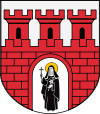Skała
| Skała | |||
|---|---|---|---|

Church in Skała
|
|||
|
|||
| Coordinates: 50°14′N 19°52′E / 50.233°N 19.867°E | |||
| Country |
|
||
| Voivodeship | Lesser Poland | ||
| County | Kraków | ||
| Gmina | Skała | ||
| Government | |||
| • Mayor | Robert Stanisław Jakubek | ||
| Area | |||
| • Total | 2.97 km2 (1.15 sq mi) | ||
| Population (2006) | |||
| • Total | 3,693 | ||
| • Density | 1,200/km2 (3,200/sq mi) | ||
| Time zone | CET (UTC+1) | ||
| • Summer (DST) | CEST (UTC+2) | ||
| Postal code | 32-043 | ||
| Car plates | KRA | ||
| Website | http://www.skala.pl | ||
Skała [ˈskawa] is a town in southern Poland, situated in the Lesser Poland Voivodeship (since 1999), previously in Kraków Voivodeship (1975-1998). On December 31, 2010, its population was 3,646.
Skala is one of the oldest town of Lesser Poland. In the early 13th century, it was a defensive gord, known as Scala and Magna Schala. Its name (the Polish word skala means rock in English) probably comes from a rocky hill above the Pradnik river valley.
During the period known as Fragmentation of Poland (1148 - 1320), Skala was the object of frequent clashes between the Piast dynasty princes. In 1228, a battle took place here between the army of Silesian prince Henry I the Bearded and Mazovian duke Konrad I of Masovia. The Silesians won, forcing Mazovian units to retreat from Lesser Poland. Skala received Sroda Slaska rights on November 10, 1267, due to efforts of Salomea, the sister of duke Boleslaw V the Chaste. The town itself was located in the area of earlier village of Stankow (Stankoy), and became home to a monastery of the Order of Poor Ladies, who came here in the 1260s.
In the late Middle Ages Skala prospered, due to a convenient location on a merchant route from Kraków to Greater Poland. The town belonged to Krakow Voivodeship, and was a local center of trade, with several guilds and a brewery, whose beer was popular in Krakow. The town was famous for its shoemakers and butchers, who delivered their produce to the markets at Krakow. Skala burned in several fires (1611, 1737, 1763, 1810, 1914), and in 1580, its population was 218. In the year 1596, there were 92 houses at Skala, and a school. Like almost all towns in Lesser Poland, Skala was destroyed in the Swedish invasion of Poland (1655 - 1660).
...
Wikipedia



